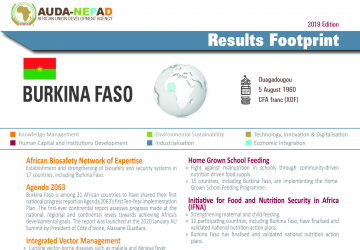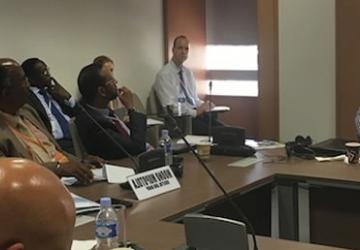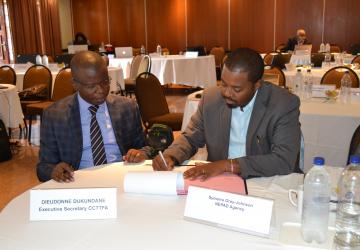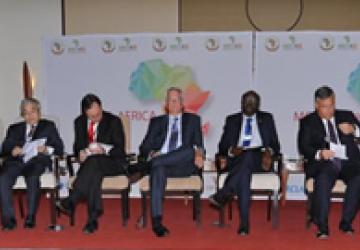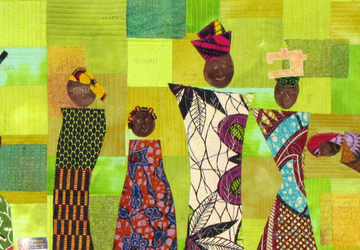 Burkina Faso
Burkina Faso
Official Name: Burkina Faso
Capital: Ouagadougou
Independence Day: 5 August 1960
Currency: CFA franc (XOF)
Key Result
At least 8,000 women have benefitted from increased participation in local street food sector associations through financial support from the NEPAD Spanish Fund for the Empowerment of African Women. The Fund also disbursed two million Euros to COMESA and ECOWAS (Sierra Leone and Burkina Faso) for the implementation of women business incubation centres.
Technical capacities of critical Government departments have been enhanced to establish and manage functional biosafety systems for the safe use of modern agricultural biotechnology.
Burkina Faso hosts a Regional Centre of Regulatory Excellence (RCORE) specialising in clinical trials oversight at the University of Ouagadougou. RCOREs are institutions with specific academic and technical regulatory science expertise and training capabilities for producing regulatory workforce in Africa.
Burkina Faso has started domesticating an African Union Model Law on Medical Products Regulation, which is expected to accelerate the regulation of medical products and fight counterfeit medicines.
Burkina Faso is piloting three confined field trials for vectors that transmit Malaria, Zika Virus Disease and Chikungunya.
The Dakar-Ndjamena-Djbouti Road/Rail Project spanning a total distance of 8715 kilometres of combined road and rail includes segments will be constructed in Burkina Faso. Also the Noumbiel multipurpose dam with a hydropower generation component will benefit Burkina Faso and Ghana.
37.1 USD million were dispersed to Burkina Faso to support the expansion of the Agriculture and Food Security Project (PAPSA) to scale up activities to promote the adoption of high performing technological packages.
The capacity of three Agriculture Training Centers in Burkina Faso on modern curriculum development and Competent based approach (CBT) for delivering training were strengthened. 159 youths have been trained on new approaches along various value chains, and over 6,200 students from several countries, including Burkina Faso received training in agricultural value chains.
The socio-economic costs of hunger and malnutrition for Burkina Faso have been estimated at USD 802 million. The study aimed to catalyse coordinated action and inform the design of nutrition-oriented policy frameworks and programmes, with greater investments to eradicate child undernutrition on the continent.
Related
Projects
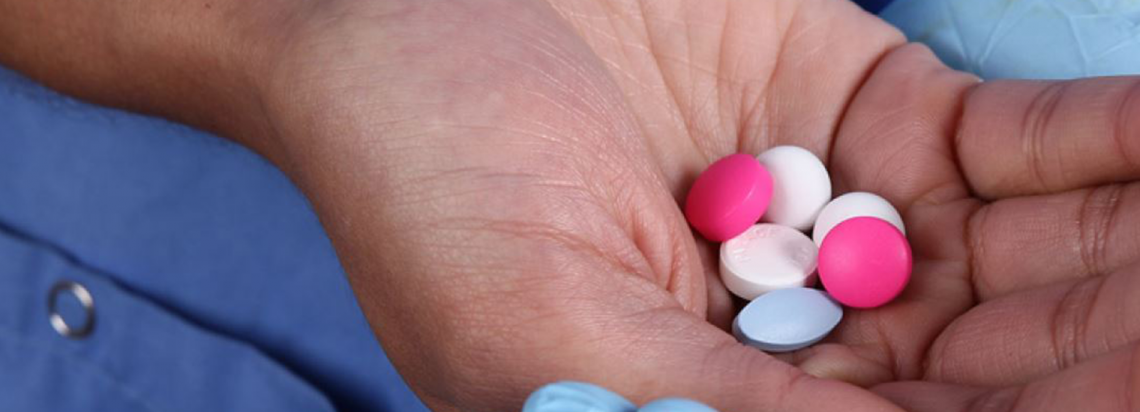
A critical AU Model Law aimed at harmonizing medical products regulatory systems in Africa was endorsed by African Heads of State and Government at the January 2016 AU Summit in Addis Ababa, Ethiopia. The AU Model Law will contribute towards accelerate the regulation of safe, quality and affordable medical products and technologies in Burkina Faso.
The West Africa Medicines Regulatory Harmonization (MRH) programme was launched in 2015 in Accra, Ghana. Burkina Faso participated in the establishment of the joint MRH Project Steering Committee and formation of 7 Technical Working Groups (TWG’s). The TWG’s are tasked with developing technical guidelines of the MRH programme. In addition, a joint framework of collaboration between WAHO and WAEMU has been agreed upon.
Burkina Faso has a designated RCORE specializing in clinical trials oversight at the University of Ouagadougou, Burkina Faso – Direction General de la Pharmacie du Medicament et des Laboratoires. RCOREs are institutions with specific academic and technical regulatory science expertise and training capabilities capable of producing regulatory workforce in Africa.

CAADP Compact: Burkina Faso signed the CAADP Compact on 22July 2010.
National Agriculture Investment Plan: Technical experts were deployed to Burkina Faso from 11 - 17 January 2012 to undertake independent technical reviews of its National Agricultural Investment Plan (NAIP). Burkina Faso also received support on undertaking an agriculture public expenditure study.
Capacity building: Demand-driven, modular, short-term pilot measures for agricultural training (along selected value chains) were offered by public and private agricultural training institutions for 400 young ‘agripreneurs’ of which 120 were women. Capacities were also enhanced in agricultural skills and entrepreneurial and commercial knowledge for trainers, youth and women in selected agricultural training centres in Benin, Burkina Faso and Togo (over 3 000, with women constituting about 30 per cent).
Business: An Internal Technical Review (January 2012) and Business Meeting (March 2012) were conducted.
Funding: Burkina Faso received funding from the Global Agriculture and Food Security Programme (GAFSP), to a tune of USD 37.1 million – planned for increasing agricultural production and food security in cereal, horticulture, livestock and fish value chains in three food deficit areas (Centre-East, Centre-South and Sahel).
Results:
- Burkina Faso’s National Programme for the Rural Sector (PNSR), known as the NAIP in other countries, has been in operation since 2010 and is the framework for the planning of all programmes in the rural sector. From 2011 to 2015, the main projects to receive funding were water control, subsidies to farmers for inputs and equipment, the promotion of non-timber forest products, making better use of agricultural research, promoting food security, and support for access to markets.
- There was growth in the production of cereals and cash crops between 2002 and 2013.
- Farmers have been helped to get seeds and fertilizer, as well as to increase mechanisation.
- Burkina Faso has also seen improvements in the sustainable development of agricultural water, including the development of nearly 25,000 ha of lowland, irrigation projects and grassroots training on irrigation techniques.
- There has also been improved productivity, competitiveness and animal vaccinations in the livestock sector. One major step was the building of a factory that can produce 100,000 tonnes of cattle feed per year.
- In the North Central region, farmers have adopted the zaï technique. In this farming technique, pits are dug in the soil to retain water and collect compost, which will consequently restore degraded drylands and increase soil fertility. Compost or fertilizer is placed in the pits before planting.
- Access to drinkable water in rural areas has also increased from 63 per cent in 2012 to 63,5 per cent in 2013, although there remains a gap within urban areas, where access to drinking water is 86,2 per cent.
- Land security has also improved through the national policy on land tenure in rural areas that was adopted 2007.
- Field schools in the country also help farmers with production problems, facilitate the sharing of knowledge and create opportunities within the agricultural sector.

Undertook the Measuring the Cost of Hunger in Africa: Burkina Faso was among the second phase countires (Burkina Faso, Ghana, Malawi, Rwanda) to implement the COHA study. The overarching objective of the multi-country study led by the AUC, NEPAD, WFP and UNECA, is to catalyse coordinated action and inform the design of nutrition-oriented policy frameworks and programmes, with greater investments to eradicate child undernutrition on the continent.
10 findings from the “Measuring the Cost of hunger” study in the first and second phase countries:
- Africa's share in the world's undernourished population has increased from 18 to 28 percent.
- Only one in five children suffereing from undernutrition occur before the child reaches the age of one year.
- Most health costs associated with undernutrition occur before the child reaches the age of one year.
- Between 7 to 18 percent of repetitions in schoold are associated with stunting.
- Stunted children achieve 0.2 to 1,5 years less in school edication.
- 8 to 33 percent of all child mortality is associated with undernutrition.
- Child mortality associated with undernutrition has reduced national workforces by 1 to 13.7 percent.
- 40 to 67 percent of current working-age population suffered from stunting as children.
- The annual costs associated with child underbutrition are estimated at 1.9 to 16.5 percent of the equivalent of Gross Domestic Product (GDP).
- Improving the nutritional status of children is a priority that needs urgent policy attention to accelerate socio-economic progress and development in Africa.

Project : TAH programme
Description : This is phase I of the continental connectivity programme that focuses on completion and standardisation of the TAH missing links by 2030
Project : Single African Sky phase 1 (design and initial implementation)
Description : Single African Sky is a continental programme that will create a high-level, satellite-based air navigation system for the African continent
Project : Yamoussoukro Decision implementation
Description : Accelerate Yamoussoukro Decision implementation by identifying countries that are ready to fully implement it, and discussing and agreeing with both their governments and airlines to launch the voluntary club on a full membership basis
Project : Dakar-Niamey Multimodal Corridor
Description : This programme is designed to modernise the most heavily travelled ARTIN corridor in West Africa (trade facilitation, OSBPs, capacity enhancement and implementation of PPP)
Project : Abidjan-Ouagadougou/Bamako (DFS)
Description : This programme would modernise and rehabilitate the multimodal corridor that suffered during civil war in Côte d’Ivoire
Project : Noumbiel
Description : Multipurpose dam with hydropower generation (for Burkina Faso and Ghana) component
Countries : Burkina Faso and Ghana, Volta River Basin
Project : Lullemeden Aquifer System
Description : Prefeasibility studies for improved use of the aquifer system
Project : ICT Enabling Environment
Description : This programme would improve the environment for the private sectors to invest in high-speed broadband infrastructure
Project : ICT Terrestrial for Connectivity
Description : This programme has two main components : secure each country connection by at least two broadband infrastructure and ensure the access to submarine cable to all landlocked countries
Project : Internet Exchange Point (IXP) programme
Description : The aim of this programme is to provide Africa with adequate internet node exchange to maximise internal traffic
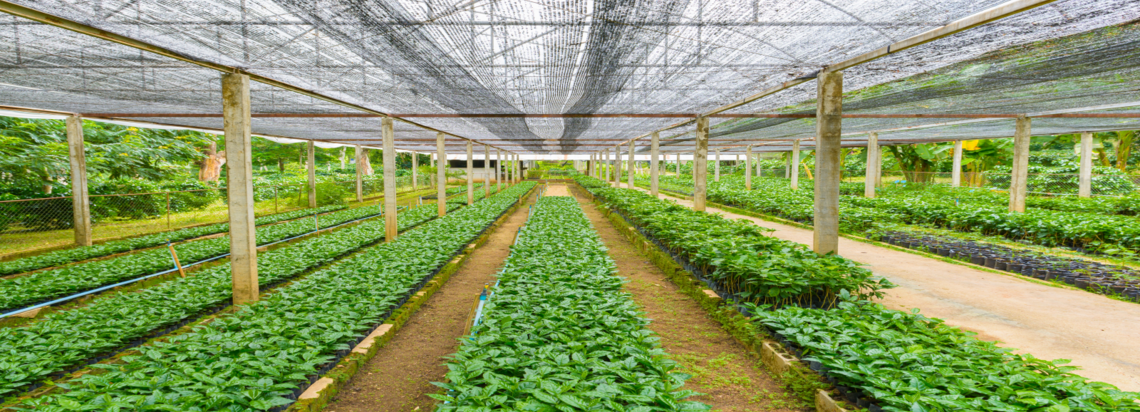


Members of Parliament from Burkina Fasoreceived guidance on formulating and implementing laws that stimulate technology innovation and adoption.
Technical capacities were strengthened to establish and manage functional biosafety systems for the safe use of modern agricultural biotechnology. Other technical support included national biosafety training workshops, biosafety short courses at African institutions and partner institutions outside Africa, notably at Michigan State University in the USA, biosafety internships, technical consultation support, and biosafety information resources.
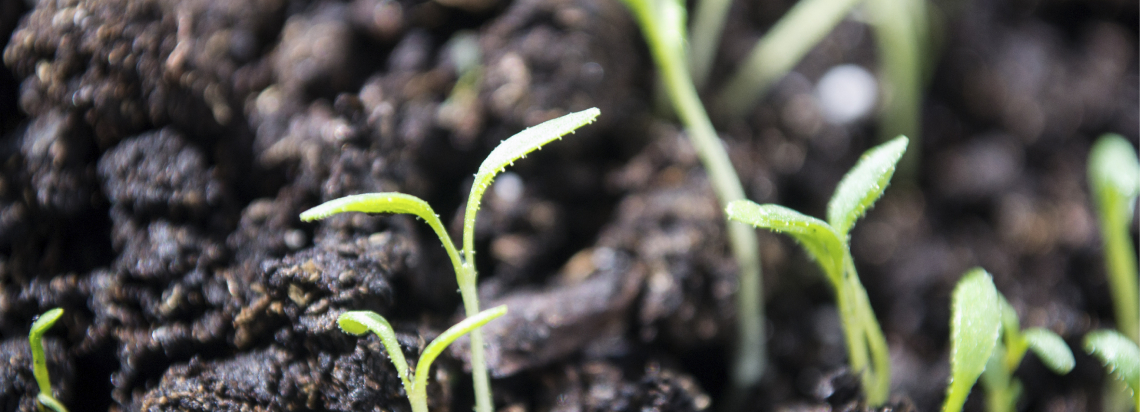
Development of Policy framework to support the implementation of Nagoya Protocol on Access and Benefit sharing arising in Burkina Faso
• 20 the Technical Monitoring Group members of the Nagoya Protocol on Access and Benefit Sharing (ABS) in Burkina Faso were capacitated to conduct future training for other stakeholders in Burkina Faso
• Government officials and Committee members of the National Assembly of Burkina Faso were informed and sensitized on ABS issues and are effectively involved in the implementation of the national ABS framework;
• The process of implementing national ABS framework in the country was identified, drawing on experiences from its 6 neighboring countries. Validation and publication under way
• 500 stakeholders are sensitized and informed on ABS;
• Information material on ABS produced and disseminated including: 5 television reports, 15 newspaper articles and 30 radio programmes on ABS.

ASTI has captured comprehensive information on STI and consequently built in-country capacity to collect, analyse & publish data and information on research & development (R&D) and Innovation

Results (2013 – 2015)
Advocacy and Strengthening of Negotiation Capacities on Post-2015 Development Agenda through the Common African Position (CAP):
• The multi-stakeholder framework of engagement specifically enhanced dialogue towards ensuring the required mass to influence the Post-2015 Global Agenda and Development Goals relevant to the Continent;
• This intervention helped strengthen country and regional level negotiating capacities for the effective incorporation and articulation of Africa’s priorities as enshrined in CAP in the final Global SDGs;
• The project enabled the participation of African stakeholders at the Means of Implementation Engagement, 3rd Financing for Development Conference and the UN General Assembly that adopted the new SDGs. This ensured the incorporation of Africa’s development priorities into the new goals through developing essential negotiation capacities;
• Through the CAP/SDGs space on the Africa Platform for Development Effectiveness (APDev), knowledge products and negotiation documents, as well as, policy briefs where successfully disseminated to the African negotiators in New York and kept the continent’s stakeholders informed of the overall process;
• Development and dissemination of post-2015 Policy Briefs on “Financing and Partnerships” and “Structural Economic Transformation and Inclusive Growth”. These are priorities outlined in the CAP and the policy briefs where utilized in the negotiation process for the African continent.
Global Partnership for Effective Development Cooperation (GPEDC):
• Africa secured the hosting of the 2nd High Level Meeting (HLM) of the Global Partnership. This was attained through robust negotiation and facilitating a common voice from Africa with regards to this critical engagement by the NEPAD Agency. The 2nd HLM will be held in Nairobi Kenya;
• The NEPAD Agency advocated for the full inclusion and participation of Africa’s Regional Economic Communities (RECs) in conducting the 2nd GP Monitoring Exercise. This was a fundamental achievement considering the RECs are the continent’s building blocks with regards to socio-economic transformation;
• The Africa Action Plan on Development Effectiveness (AAP) was granted the status of an official Global Partnership Initiative (GPI) at the Planning Meeting in Brussels. The AAP was developed by the NEPAD Agency in consultation with African multi stakeholders. This has enabled the Agency to successfully mobilize resources towards the implementation of the AAP.

Project : Dakar-Ndjamena-Djbouti Road/Rail Project
Description : An 8 715 km road/rail project which entails combining TAH 5 (Dakar to N’djamena) and TAH 6 (N’djamena to Djibouti)
Description : The use of political gravitas and goodwill to unblock and facilitate political bottlenecks affecting the implementation of ICT broadband and optic fibre projects on the continent

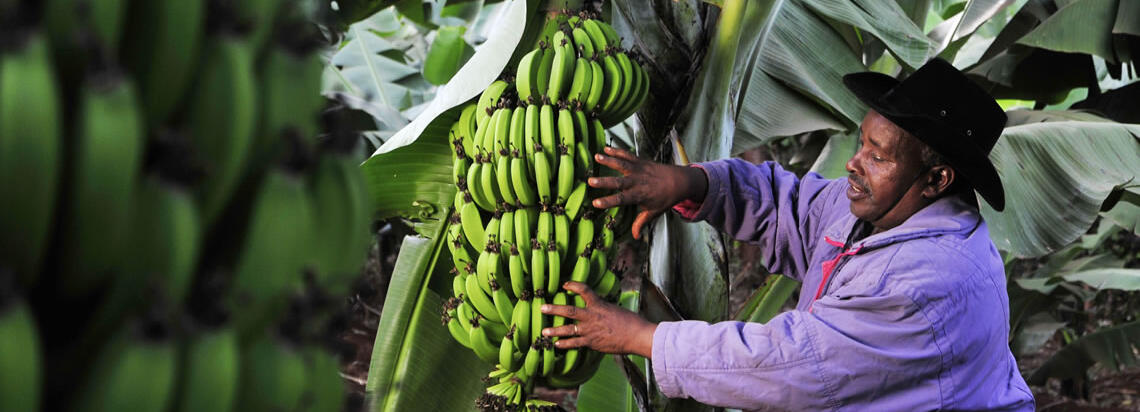
- Grow Africa is working to establish a strong multi-stakeholder platform in Burkina Faso to represent the agriculture sector and enable better collaboration with the private sector.
- In order to mutualise the different interventions of partners in the mango sector in Burkina Faso, the Association of Professionals in the Mango sector in Burkina Faso (APROMAB) and the Grow Africa created an inclusive multi-stakeholders platform in the mango value chain in Burkina Faso. The platform launching workshop took place on March 29, 2018 in Ouagadougou, Burkina Faso.

- Technical support was provided to Burkina Faso to conduct cost-benefit analyses as well as coordination of the formulation and implementation of the Country Strategic Investment Framework (CSIF) on SLWM. The CSIF ensures that SLWM practices are integrated into national and environmental agriculture frameworks.
- As a result of the development of a CSIF, countries are able to align stakeholders and resources towards the implementation of investments projects, such as the Third Community-Based Rural Development Project in Burkina Faso. The Project aims to enhance the capacity of rural communities and decentralized institutions for the implementation of local development plans that promote sustainable land and natural resources management and productive investments at commune level. The Sahel and West Africa Program (SAWAP), whose aim is to address land degradation and desertification, boost food security and support communities to adapt to climate change, also provided support to The Third Community-Based Rural Development to the tune of $ 93.41M.
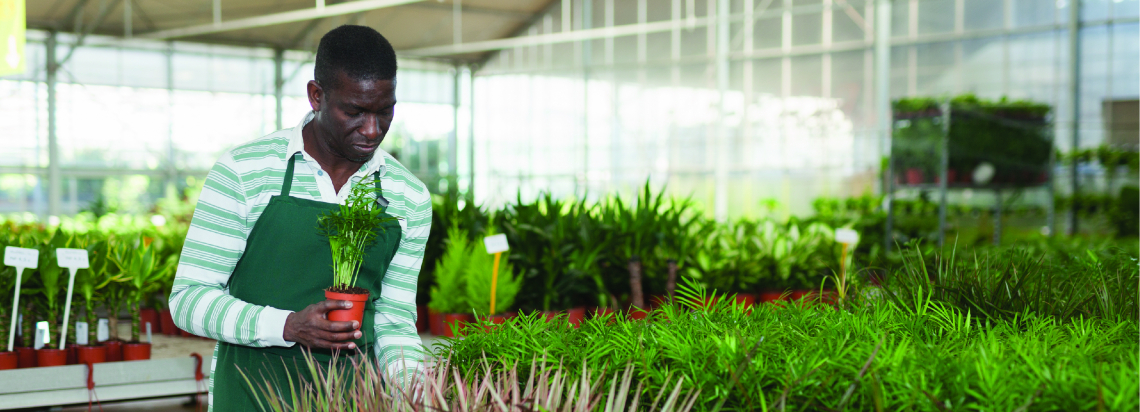
Since its inception in 2014, ATVET has provided support to leading structures such as Direction Générale du Foncier, de la Formation et de l´Organisation du Monde Rural (DGFOMR). Agricultural training centres were also supported in establishing a database. To facilitate the integration of ATVET into national strategies, a paper advocating for the mainstreaming of agricultural vocational training in the Programme National du Secteur Rural (PSNR), Burkina Faso’s NAIP, has been prepared.
ATVET aims to promote knowledge sharing through knowledge management of best practices using the NEPAD knowledge management portal. Curricula, monitoring manuals, and organisation materials were developed for three occupations of rice value chains, three occupations of sesame value chains and five occupations of cashew value chains.
14 trainers and training centre managers were trained on the competence-based approach. The entrepreneurship training module on compiling a business plan was completed. 24 trainers from training centres were coached on the theoretical aspects of entrepreneurship training based on the Bauern-Unternehmerschulung (BUS) approach. Over 200 youth, including 80 females, were trained on entrepreneurship, and the development of a business plan using the BUS approach.

"At the beginning of 2014, 37 of the 42 opted-in African countries have completed a rapid assessment / gap analysis. The next step for countries is to develop a SE4LL Action Agenda and Investment Prospectus(es). To support this process, the SE4ALL Africa Hub partners have led the development of Africa Guidelines for SE4ALL national Action Agendas. The Africa Guidelines lay out principles and process for developing Action Agendas and put forward a balanced approach of centralized and decentralized solutions to achieve universal access to energy services.
Progress in Burkina Faso:
The Gambia,
Sierra Leone and Burkina Faso are seeking technical validation of their Action Agendas, while
the remaining West African countries are actively developing their Action Agendas, the majority of
which are expected to be fnalised. Burkina Faso AA is in advanced stages and IP is under development."
you agree to the AUDA-NEPAD Privacy Policy.



